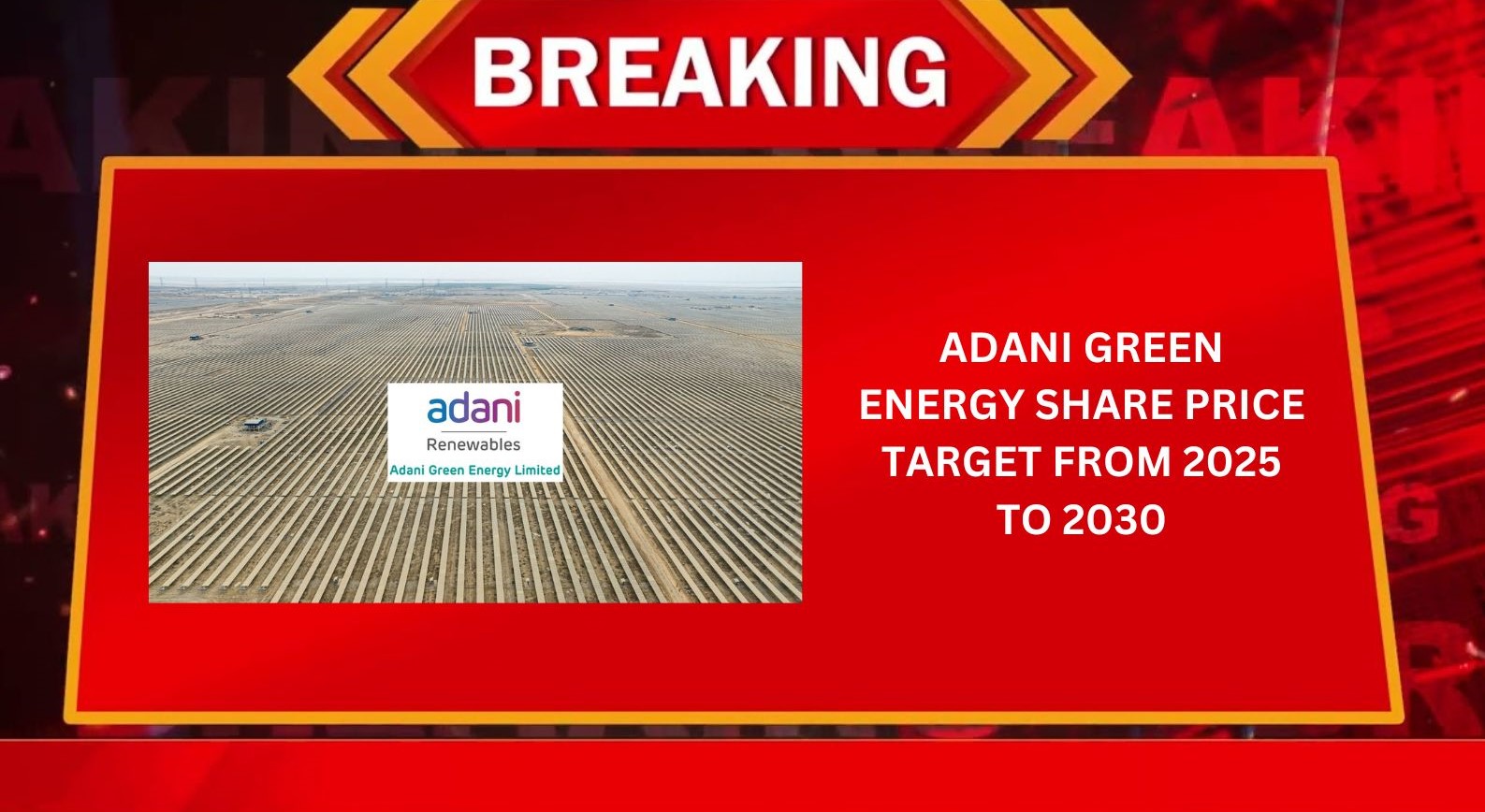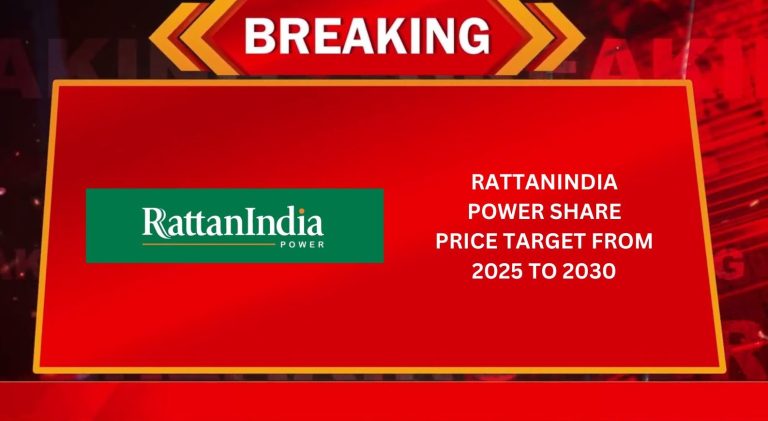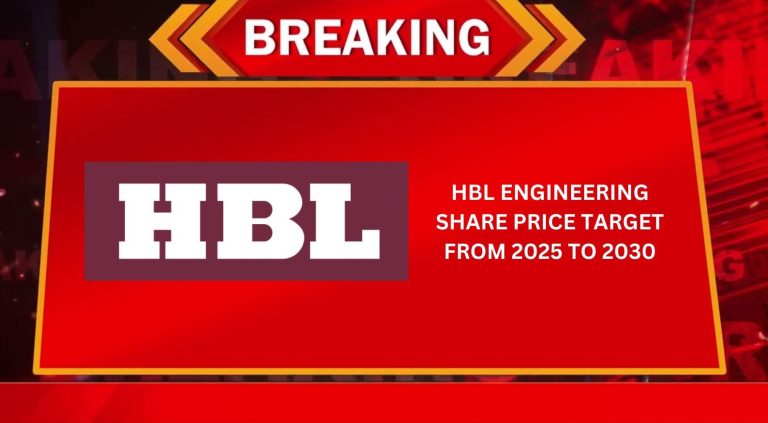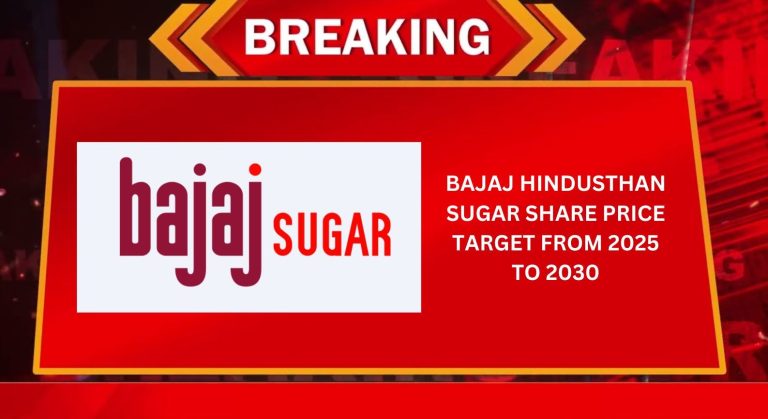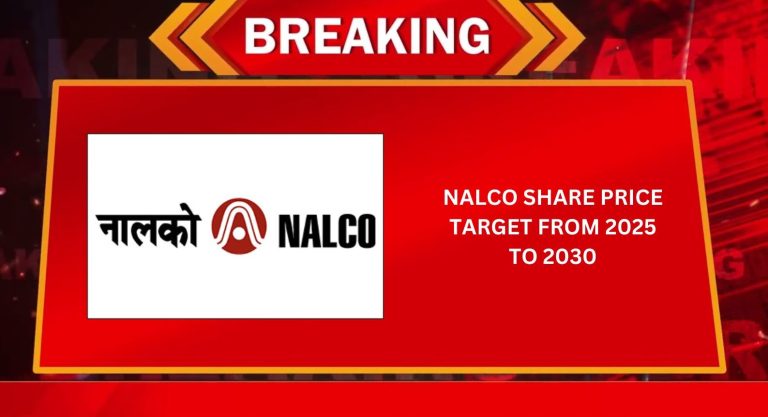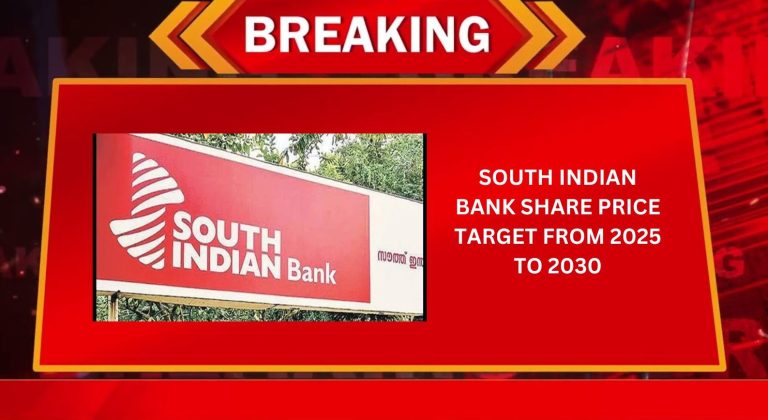Adani Green Energy Share Price Target From 2025 to 2030
Adani Green Energy Share Price Target From 2025 to 2030: Adani Green Energy Limited (AGEL) is a part of the Adani Group and India’s first renewable energy company. Committed to producing energy through solar and wind energy, AGEL has increased capacities in a few years to become one of the largest renewable energy companies. As of now, till March 2025, the company has a diversified asset pool in the way of India-specific renewable energy assets supporting substantially India’s energy sustainability objectives. Leadership and Management
AGEL is driven by visionary leadership whose sole goal is to establish renewable energy sources. Its CEO has a lengthy career in the energy sector and has mapped out the company. This kind of leadership has made AGEL see record growth in accordance with global efforts towards sustainability and Indian initiatives to sell its knowledge in renewable energy.
Market Capitalization and Workforce
- As of March 2025, AGEL’s market cap stands at approximately ₹1,35,181 crore. This humongous valuation speaks volumes about investors’ confidence in the business model and growth of the company. The company possesses a geographically diverse workforce devoted to operational excellence to the same degree as they are devoted to cutting-edge renewable energy technology.
Competitive Position
- AGEL is a market leader in its business of competing with industry players in its competitive renewable power business. Its competitive advantage is its vertically integrated project development, construction, and operation business model. The technology and sustainability focus of AGEL is what makes the company a market leader relative to its peers.
Financial Health
Revenue and Profit Growth
- In the past five years, AGEL has been reporting healthy finances. Its top line has been growing consistently with new schemes and efficient operations. It also has better profitability with efficient cost control and investment.
Debt-to-Equity Ratio
- AGEL’s debt-to-equity ratio is 6.38, indicating high leverage. While this reflects high borrowing, use of debt to finance capital-expenditure projects by infrastructure companies needs to be curbed. Investors will have to watch this ratio to gauge financial well-being.
Earnings Per Share (EPS)
- The company’s Earnings Per Share (EPS) is ₹8.61. The same has increased in the recent past, reflecting healthy earnings growth and operating efficiency.
Cash Flow
- AGEL has been able to enjoy a strong cash flow position, where there is sufficient liquidity to fund current operations as well as future expansion plans. A sound cash flow is required to support growth, especially in the capital-intensive renewable energy sector.
Important Financial Statements
- Balance Sheet: Reflects a strong asset base with massive investment in renewable energy projects.
- Income Statement: Showing revenue growth and rising profitability margins.
- Cash Flow Statement: A reflection of healthy operating cash flows, consistent with the growth aspirations of the firm.
Stock Performance
Price Trends
- AGEL’s share price was highly volatile in the last 52 weeks. The 52-week high is ₹2,174.10 and the 52-week low is ₹758.00. As of till yesterday of trade, the share opened at ₹874.00, touched an intraday high of ₹896.85, and closed at ₹853.45.
Volatility
- The share of the company has been varying, based on market forces and industry trend. Investment needs to be made considering this variation.
Valuation Indices
- Price-to-Earnings (P/E) Ratio: The P/E ratio of AGEL stands at 99.12, which is significantly higher than the industry average P/E ratio of 21.23. Whenever the P/E ratio is higher, it implies that the investors expect monstrous growth in future earnings.
- Price-to-Book (P/B) Ratio: P/B ratio stands at 12.78, i.e., market price with respect to company’s net worth.
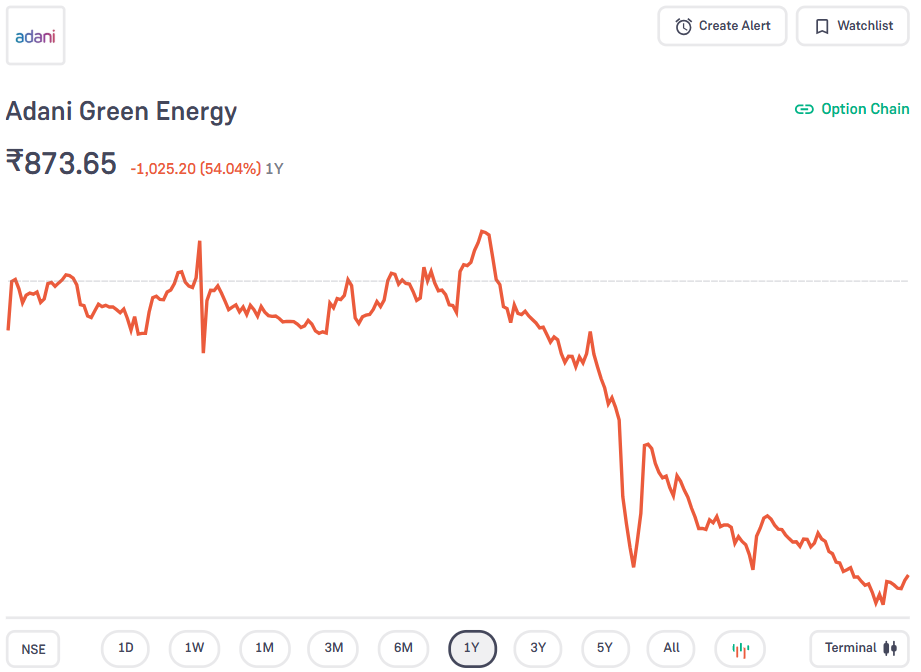
Technical Indicators
- Relative Strength Index (RSI): 14-day RSI is 45.5, and the stock is neither overbought nor oversold.
- Moving Average Convergence Divergence (MACD): MACD stands at -36.4, below mid-point, and indicates bearish trend.
- Average Directional Index (ADX): ADX is 24.0, and it indicates low trend strength shown.
Dividends and Returns
Dividend Policy
- AGEL does not issue dividends but invests earnings in the growth of its renewable energy business. Its share buyback policy is to build long-term shareholders’ capital appreciation.
Share Buybacks
- AGEL’s current share repurchase policy is not available. Its management is committed to achieving growth and development of the renewable energy business.
Comparison to Industry Competitors
- The operating performance of the AGEL has been consistent in the renewable business based on its positioning strategy and profitable business. Investors must, however, account for the high valuation multiples of the company when comparing the company with peers.
Growth Prospects
Growth plans
- AGEL has taken extremely robust plans to inject clean energy capacity. The firm will be investing significantly in solar and wind projects, as per the renewable energy plan of India. The expansion will create top-line as well as bottom-line growth over the next two years.
Technological Innovations
- AGEL is also investing in new technology for building efficiency and saving costs. Grid integration and energy storage technologies are some of the main areas of focus, placing AGEL at the forefront of the renewable power sector.
Strategic Partnerships
- AGEL has established strategic partnerships to further consolidate its leadership position in the market. The partnerships are designed to achieve synergies and spur further growth of the renewable energy businesses, both regionally and globally.
External Factors
Economic Trends
- India’s economic growth and growing energy needs open up opportunities for AGEL. Macro economic determinants of inflation and interest rate trends are able to influence the company’s investment strategy and its finances.
Regulatory Environment
- AGEL has a policy-dominated business. Supportive policy such as subsidy and incentive to renewable energy programs offer scope for growth. Decline in environmental legislations or policy rules can, however, affect project viability and cost of operations.
Global Market Conditions
- The global trend towards the expansion of the renewable energy sectors benefits AGEL as nations across the globe are making more and more investments in renewable energies. Foreign collaborations and foreign investment in Indian renewable energy will also increase growth opportunities for AGEL.
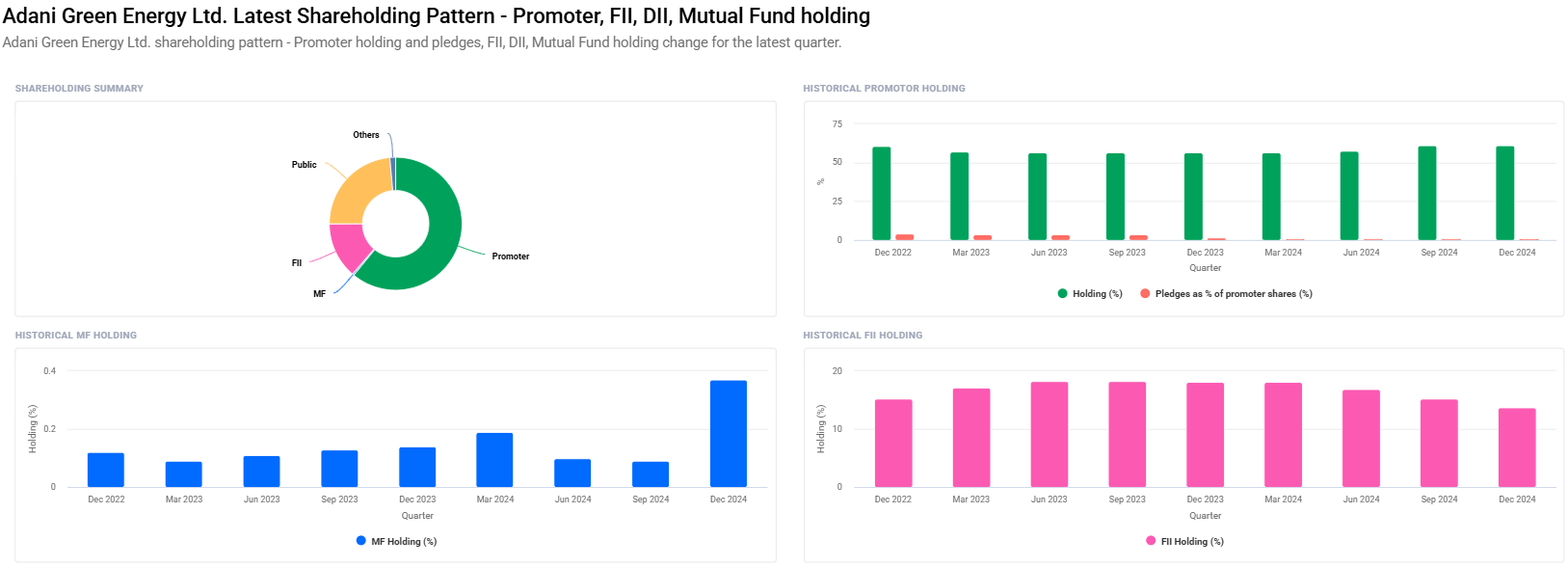
Share Price Forecast of Adani Green Energy for 2024-2030
| YEAR | SHARE PRICE TARGET (₹) |
| 2025 | ₹2200 |
| 2026 | ₹3700 |
| 2027 | ₹4200 |
| 2028 | ₹5700 |
| 2029 | ₹7200 |
| 2030 | ₹8700 |
Factors Influencing Share Price Prediction
- Demand for Clean Energy: Growing domestic and international demand for clean energy will drive AGEL’s top line.
- Expansion Plans: Aggressive expansion by the company in wind and solar power initiatives can improve its profitability.
- Government Policies: Sensible policies and incentives for clean energy will drive long-term growth.
- Macro-Economic Factors: Share performance and investor sentiment can be influenced by interest rates, inflation, and global economy conditions.
- Competitive Landscape: Relative efficiency of AGEL as compared to others will drive its market share.
- Technology Advancement: Upcoming investment and technology for energy storage will ensure peak operating efficiency and cost advantages.
Conclusion: Is Adani Green Energy a Good Investment?
Adani Green Energy Limited will expand in the long term after strategic, technological development, and rising global demand for clean energy. Shareholders must also be reminded of the record company valuations and stock market volatility, however.
Who Should Invest?
- Long-term investors seeking exposure in the renewable energy sector.
- ESG investors seeking exposure in clean energy projects.
- Risk-taking investors willing to accept stock market volatility.
Who Should Not?
- Short-term speculators looking to capitalize on rapid profits from market volatility.
- Value investors looking to receive stable dividend stream of returns.
- Risk-averse investors looking to avoid high-leverage and high-debt environments.

